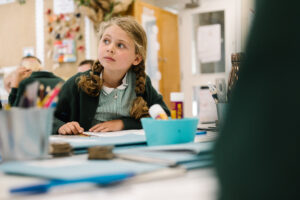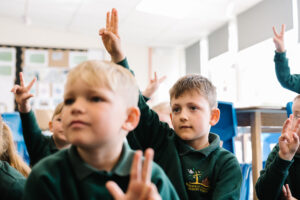
Our staff worked together to consolidate our teaching principles into what we call ‘The Warkworth Way’. They are informed by our vision and values, our proud history, and educational research.
The Warkworth Way is that we teach rigorous lessons with high expectations within a loving, nurturing environment, enabling all to flourish.
How do we teach at Warkworth?
We believe excellent education is the solemn transmission of the best that has been thought, said and written – the enduring ideas, language and knowledge that help us understand ourselves and the world. At Warkworth, our curriculum is knowledge-rich, delivered through research-informed instruction that demands focus, fosters clear reasoning, and cultivates deep understanding and character. Our pupils are not just learners but custodians of a time-honoured tradition, encouraged to nurture an insatiable thirst for truth and beauty.
Rooted in Jesus’s promise of life in all its fullness, our Christian mission compels us to expose every child to a broad, balanced and intellectually challenging programme. Love remains our guiding principle – evident in our unwavering support, high expectations and the example set by every adult – so that each pupil is prepared to serve the common good with wisdom, courage and compassion.
In short, the Warkworth Way is that we teach rigorous lessons with high expectations within a loving, nurturing environment, enabling all to flourish.
Our approach draws on the latest educational research, which shows that children learn most effectively through clear, direct teaching (explicit instruction) and that memory is the engine by which they make connections both within and across subjects and in real-world contexts.
Vulnerable children are equally, if not more, entitled to acquire and celebrate the knowledge and cultural capital that an ambitious curriculum can provide. This comes from our strong belief in inclusivity, so they can fulfil their God-given talent. As such, we take a ‘keep up, not catch up’ approach, focusing on adapting teaching approaches rather than curriculum content.

What you will see in a classroom
- Teacher-led education that drives high standards with love.
- Simple, effective, research-backed and gimmick-free teaching approaches, including explicit instruction.
- High participation, high challenge education that promotes independence and resilience and which places a high demand on student involvement and engagement.
- A focus on thinking – the role of the adult being to guide children’s thought through deliberate, careful practice. Thought is then improved by dialogue as external dialogue directly impacts internal dialogue within thought processes.
- Dialogue-led teaching: whilst classroom practice is teacher-led, this is dependent on children participating in discussions. This may include:
- Frequent checks for understanding
- Adult modelling thought
- Dialogue between children and teacher (through questioning) and between children themselves through discussion
- Discussion which is active, meaningful, challenging, reflective, and mediated
- Think/pair/share and related activities
- Children given time to think and time to articulate their thoughts.
- Relationships at the heart of teaching practice.
- Scaffolding to support children meet age-related expectations, rather than different objectives wherever possible.
- A focus on making connections across and between curriculum.
- Promoting an environment to be curious, to ask questions and to want to know more.

